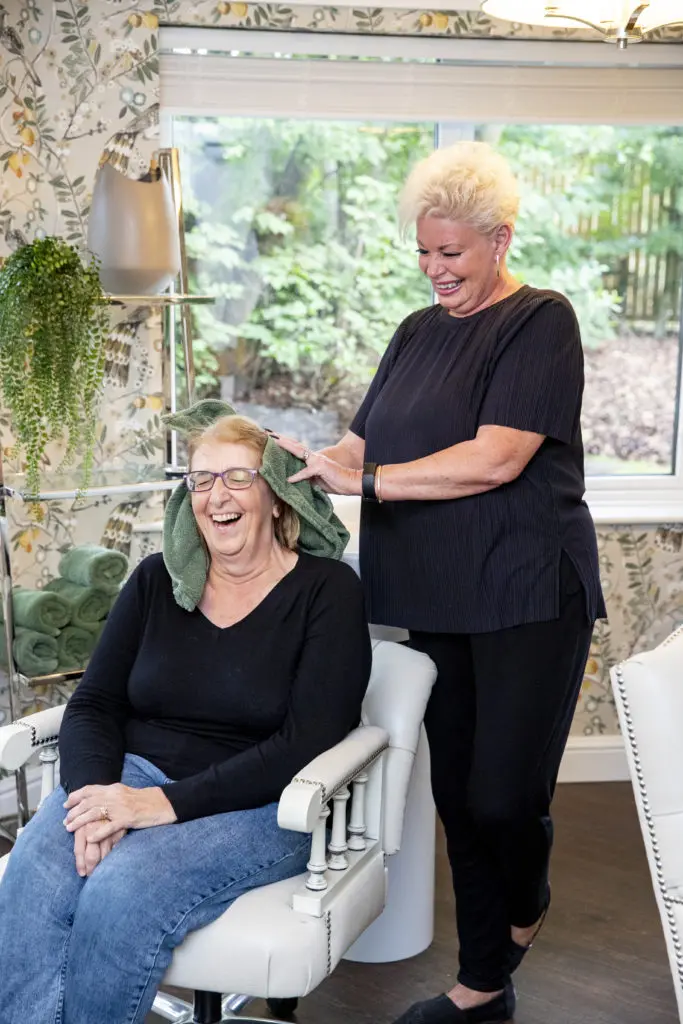
Frequently Asked Questions…
When looking for a care home, a lot of questions can arise. This section provides quick answers to common queries about Spellman Care, helping you understand our luxury residential, nursing, and dementia care services at a glance.
Spellman Care offers a comprehensive range of services including General Nursing Care, Residential Care, Respite Care, Palliative Care, Complex Care, Dementia Nursing and Dementia Residential Care.
Our homes are located in peaceful quiet corners of Skipton, Guiseley, Silsden and Steeton.
We opened our first home, Steeton Court, over 35 years ago. You can read our full story here.
Yes, our testimonials often praise the support provided by Spellman Care staff to both residents and their families.
Our Relative Support Hub also offers online signposts and advice for Relatives.
A care plan is a written document that details the specific care and support an individual needs. It’s written from the resident’s perspective to ensure person-centred care, focusing on their unique abilities, preferences, and goals.
The plan outlines how care will be delivered, covering personal care, health needs, social and emotional support, and risk management. It’s a living document, regularly reviewed and updated with the support of the resident and their loved ones, ensuring it always meets their evolving needs. It’s a vital tool for consistent, high-quality care.
When exploring care options, it’s essential to understand the key differences between a care home (often called a residential care home) and a nursing home. The primary distinction lies in the level of medical and nursing care provided.
Care Home (Residential Care)
A care home focuses on personal care and support with daily living activities. This includes assistance with things like washing, dressing, eating, and mobility. It’s an ideal choice for individuals who need help with these tasks but do not have complex medical needs that require constant professional nursing attention. The staff in a care home are primarily Care Assistants and Senior Carers, trained to provide support and companionship.
Nursing Home
A nursing home offers all the services provided by a care home, plus 24-hour nursing care from qualified registered nurses. This makes nursing homes suitable for individuals with significant and complex medical conditions that require ongoing medical oversight, monitoring, or skilled nursing interventions (such as wound care, medication management, or post-operative care).
Why Choose a Nursing Home Even for Residential Needs?
Sometimes, individuals and their families choose a nursing home even if the resident’s current needs only require residential care. This proactive decision can offer a smoother transition in the long run. If a resident’s health deteriorates and their needs become more complex, they wouldn’t have to endure the disruption of moving from a care home to a nursing home. This can provide peace of mind and continuity of care for the resident.
You should consider a care home if you or your loved one struggles with daily tasks, even with support from family or carers, or if their medical needs require constant professional attention.
To help determine the most suitable type of care, a care needs assessment by your local authority can be invaluable.
Once you’re considering specific options, it’s vital to visit prospective homes in person to get a feel for the atmosphere, staff, and facilities.
First Impressions: Is the home clean, welcoming, and well-maintained? Do staff seem friendly and engaged with residents?
Atmosphere: Does it feel homely? Are residents happy, active, and well-groomed?
Staff: Observe interactions. Ask about staff-to-resident ratios, staff training (especially for specific conditions like dementia), and staff retention rates.
Rooms: Are they comfortable, well-decorated, and is there enough storage? Can residents personalise their rooms with their own belongings and furniture?
Communal Areas: Are there various comfortable lounges, accessible gardens, and spaces for socialising and activities?
At Spellman Care, our dedicated team of Activity Coordinators works tirelessly to publish an engaging and enriching schedule of activities each week. This schedule is thoughtfully tailored to the residents in our care, with special effort taken to include each individual’s hobbies and interests.
Beyond our diverse in-house programme, we are delighted to regularly host a variety of professional entertainers and musicians who bring vibrant performances directly to our homes. These sessions provide wonderful opportunities for singing along, enjoying live music, and simply being entertained.
Adding to our activity schedule, you’ll also find weekly minibus trips, thoughtfully hosted by our dedicated Activity Driver. These excursions allow our residents to remain a key part of their local community, exploring new places and revisiting old favourites. Popular destinations include scenic spots like Ilkley Moor, bustling retail hubs such as Boundary Mill, visits to local community groups, and even trips to local sports games – ensuring there’s always something exciting to look forward to.
At Spellman Care, mealtimes are a highlight, focusing on delicious, nutritious, and personalised dining. Our talented chefs prepare all meals freshly in-house, often using local produce.
We pride ourselves on catering to all tastes and dietary needs, including medical requirements and modified diets (like pureed meals), as well as cultural and personal preferences. Our catering team and carers meticulously cross-reference each resident’s care plan with the daily menu to ensure every need is safely met.
Residents can enjoy meals in our comfortable dining areas or in their own rooms. We also provide constant access to drinks and delightful homemade snacks throughout the day. Our team continuously monitors nutritional intake to ensure optimal well-being.
Privately Funded Residents
Many residents choose to privately fund their care. This means they pay for the cost of their stay themselves, without the involvement of the local council or the NHS.
All our residents receive the same high quality care, no matter how their care is funded.
What is included in my care home fee?
- Care needs like assistance with dressing, bathing, and medication
- Meals and accommodation
- Regular activities and entertainment
- Trips out on the home minibus
- The use of our salon, internet access, access to extensive communal spaces
- Freshly decorated and modern spaces throughout the home
- Hairdresser Visits
- Physiotherapists, Chiropodists and other external therapies and appointments
- Personal items: Mobile phones, televisions in rooms, glasses
- Private (Non-NHS) healthcare
- Clothing
- Personal purchases
What funding is available?
If you believe you are eligible for funding, you should speak to your GP or Social Worker.
Below are some of the types of funding they may direct you to:
- Local Authority Contribute
- Funded Nursing Care (FNC)
- Continuing Healthcare (CHC) Contribution
- Section 17 Funding
- Discharge To Assess (D2A)
If you are already a resident at one of our homes, and think you may be eligible for funding, we will support you in applying for this.
Lifestyle Choice Fees
We understand how important it is to stay connected with your loved ones. That’s why, across all four of our Spellman Care homes, we operate an ‘anytime visiting’ policy, empowering you to spend time with your loved one whenever you choose.*
For those living further afield, each of our homes is equipped with its own ‘Tiny Tablet’ – a large, portable, TV-sized Android tablet. This can be used for video calls upon request, allowing you to see and speak with your loved one. Of course, traditional phone lines are also available if you prefer a more relaxed telephone conversation.
To keep you even more connected, we encourage relatives to follow us on social media and subscribe to our Weekly Newsletter. These channels provide regular updates from the home, sharing the latest news and offering glimpses of your loved one participating in our engaging activities.
*Please note that in the unlikely event of an outbreak within the home, the local authority may advise us to temporarily restrict visiting to ensure the safety and well-being of all our residents.
Whilst it may not always be possible to facilitate your pet to live with us permanently, we always welcome visiting from furry friends!
First, check the Care Quality Commission (CQC) website (cqc.org.uk) for their inspection reports and ratings. A “Good” or “Outstanding” rating is generally a positive sign, as the CQC assesses if a home is Safe, Effective, Caring, Responsive, and Well-led.
Next, verify the home’s Food Hygiene Rating (on a scale of 0-5) on the Food Standards Agency (FSA) website (ratings.food.gov.uk). A rating of 4 or 5 indicates excellent standards.
You should also read verified reviews from residents and families on online platforms like CareHome.co.uk. Look at overall scores, consistent feedback, and how management responds to comments.
Finally, always visit the home in person. Observe the atmosphere, cleanliness, and staff-resident interactions. Ask detailed questions and, if possible, speak to current residents or their families.
Often, residents considering a permanent move to one of our homes choose to begin with a respite stay. This provides an invaluable opportunity to settle in, experience daily life within the home, meet our dedicated team and fellow residents, and truly decide if it feels like the right long-term fit, all without the immediate commitment of a permanent admission.

